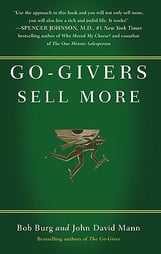Achieving commitment towards sales goals and success is crucial for cultivating a successful sales team. It requires a concentrated effort and the growth of each team member. Dave Kurlan, the founder of Objective Management Group, defines commitment to sales success as “The willingness to do whatever is required to succeed in sales, at reaching quota, achieving goals and closing a particular deal or account- whatever it takes (ethically).” It's important to note that It’s not whatever it takes as long as it’s comfortable or as long as it’s not too difficult.
How many of your people are really committed to sales success as it is defined above? Commitment requires strong personal desire to achieve personal goals. Companies continue to set sales goals for producers without ever knowing if these people are motivated to reach their own personal goals. This is a big mistake.
We must get commitment from salespeople, even top producers, to execute at the high levels necessary. And more importantly, we must get each individual’s commitment to perform the activities required to reach his/her specific personal goals. Without this customized goal plan, your company sales goals are destined to fall short.
Salespeople commit to what is important to them. While they may understand the benefit of shareholder value increasing, this is not what will drive them to do the activities. What will motivate a salesperson is his/her own set of nonnegotiable personal objectives, goals and ambitions. As a sales coach, your job is to help each individual uncover these personal goals and help him/her understand that, if committed, how he/she will reach these goals.
Next, we must help each salesperson discover his/her “current state,” or where they stand relative to these goals. When there is a gap, as when the personal income forecast from current sales pipeline and closing ratio will not be sufficient to buy the dream house, we must help the salesperson discover the pain and disappointment that will occur if he/she does not achieve this goal.
To do this, we must use a series of probing questions, questions that will illuminate what his/her future looks like based upon current production. This process is an important part of helping a salesperson stay committed to sales success and achieving their goals.
Once we have gone through this initial discovery and questioning process, we arrive at the salesperson’s ultimate desired outcome. In the case of a salesperson who is underperforming or failing to execute effort or skills, we must get him/her to agree, voluntarily, that failure to achieve the desired outcome is not an acceptable option.
It is important that the salesperson desires and verbalizes this. It is not effective for him/her to answer a leading question that you might pose such as “You don’t want that to happen, do you?” Instead, you must ask “Is that a problem? Are you sure that’s a problem? And is it compelling enough for you to make changes?” Only after the salesperson verbally acknowledges that he/she wants to change and needs to change, can we move to the next step. Only then can we get the salesperson to agree to some form of disciplined structure around the necessary sales activity.
Once we have a salesperson’s commitment to fix a problem, we must get them to commit - to agree to do everything possible to succeed. At this point, we can implement a sales development program that will help him/her move toward their goals.
A disciplined sales development program will probably be harder on you than it is on the salesperson because you will need to inspect along the way. Example: If the disciplined program for filling the pipeline includes making phone calls every Thursday morning at ten o’clock, you will need to be there to hold the salesperson accountable. Or if you expect the individual to ask for introductions daily, you must inspect these reports at the end of each day. That is your commitment to their sales success.
Do not ask for a salesperson’s commitment and fail to do your part. If you are to be an effective sales coach, helping your people to achieve their goals, you must make your own commitment to do whatever is necessary. A lack of consistent performance in sales coaching and management on your part will translate into a lack of commitment in your salespeople.









